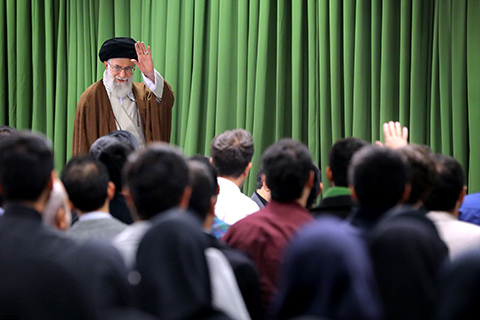 TEHRAN: Iran's Supreme Leader Ayatollah Ali Khamenei meets with Iranian students in the capital Tehran. Khamenei dismissed US President Donald Trump's aggressive criticism as the 'rants and whoppers" of a "brute" in a speech. - AFP
TEHRAN: Iran's Supreme Leader Ayatollah Ali Khamenei meets with Iranian students in the capital Tehran. Khamenei dismissed US President Donald Trump's aggressive criticism as the 'rants and whoppers" of a "brute" in a speech. - AFPANKARA: Iranian Supreme Leader Ayatollah Ali Khamenei said yesterday Tehran would stick to its 2015 nuclear accord with world powers as long as the other signatories respected it, but would "shred" the deal if Washington pulled out, state TV reported. Khamenei spoke five days after US President Donald Trump adopted a harsh new approach to Iran by refusing to certify its compliance with the deal, reached under Trump's predecessor Barack Obama, and saying he might ultimately terminate it. "I don't want to waste my time on answering the rants and whoppers of the brute (US) president," Khamenei said in a speech to students in Tehran quoted by state television. "Trump's stupidity should not distract us from America's deceitfulness...If the US tears up the deal, we will shred it."
Trump's move put Washington at odds with other parties to the accord - Britain, France, Germany, Russia, China and the European Union - who say Washington cannot unilaterally cancel a multilateral accord enshrined by a UN resolution. Khamenei, who has the final say on Iran's state matters, welcomed their support but said it was not sufficient. "European states stressed their backing for the deal and condemned Trump ... We welcomed this, but it is not enough to ask Trump not to rip up the agreement. Europe needs to stand against practical measures (taken) by America."
Under the deal, Iran agreed to curb its disputed uranium enrichment program in return for relief from international sanctions that crippled its economy, and UN nuclear inspectors have repeatedly certified Tehran's compliance with the terms. Trump accuses Iran of supporting terrorism and says the 2015 deal does not do enough to block its path to acquire nuclear weapons. Iran says it does not seek nuclear arms and in turn blames the growth of militant groups such as Islamic State on the policies of the United States and its regional allies. In decertifying the nuclear deal last week, Trump gave the US Congress 60 days to decide whether to reimpose economic sanctions on Tehran that were lifted under the pact.
'Do not interfere'
In a major shift in US policy, Trump also said Washington will take a more confrontational approach to Iran over its ballistic missile program and its support for extremist groups in the Middle East. Tehran has repeatedly pledged to continue what it calls a defensive missile capability in defiance of Western criticism. The United States has said Iran's stance violates the 2015 deal in spirit as missiles could be tipped with nuclear weapons.
Tehran has said it seeks only civilian nuclear energy from its enrichment of uranium, and that the program has nothing to do with missile development efforts. "They must avoid interfering in our defense program ... We do not accept that Europe sings along with America's bullying and its unreasonable demands," Khamenei said. "They (Europeans) ask why does Iran have missiles? Why do you have missiles yourselves? Why do you have nuclear weapons?" The Trump administration has imposed new unilateral sanctions targeting Iran's missile activity. It has called on Tehran not to develop missiles capable of delivering nuclear bombs. Iran says it has no such plans.
Iran has one of the biggest ballistic missile programs in the Middle East, viewing it as an essential precautionary defense against the United States and other adversaries, primarily Gulf Arab states and Israel. "Americans are angry because the Islamic Republic of Iran has managed to thwart their plots in Lebanon, Syria, Iraq and other countries in the region," Khamenei said. Supporters of the deal fear Trump's decision to decertify the deal could eventually unravel it, causing more tension in the crisis-hit Middle East, where Shiite Iran is involved in a decades long proxy war with US-ally Sunni Saudi Arabia.
Military chief warns
Meanwhile, Iran's military chief warned Israel against violating Syrian airspace and territory on a visit to Damascus yesterday, Iranian state media said, a sign of rising tensions with Israel as it voices concern over Iranian influence in Syria. General Mohammad Baqeri also pledged to increase cooperation with the Syrian military to fight Israel and insurgents in Syria, where Iranian forces and Iran-backed militias including Hezbollah have provided critical military support to Damascus. "It's not acceptable for the Zionist regime to violate the land and airspace of Syria anytime it wants," Baqeri said in the Syrian capital at a news conference with his Syrian counterpart.
"We are in Damascus to assert and cooperate to confront our common enemies, the Zionists and terrorists," he said, a reference to Israel and Sunni Muslim jihadists including Islamic State. "We drew up the broad lines for this cooperation," Syrian state media cited the Iranian military chief of staff as saying. Iran's expanding clout during Syria's six-year-long civil war has raised alarm in Israel, which has said it would act against any threat from its regional arch-enemy Tehran. Israel's air force says it has struck arms convoys of the Syrian military and Hezbollah nearly 100 times during the war.
Israeli Prime Minister Benjamin Netanyahu has said that Iran was strengthening its foothold in Syria and that Israel was watching developments. He said Israel would do whatever it takes to protect its security. Tensions had risen this year between Lebanon's Hezbollah and Israel, which have avoided a major conflict since 2006. This week, the Israeli military said it attacked a Syrian anti-aircraft battery that had fired at its planes over Lebanon. But the Syrian army said it hit an Israeli warplane after it breached its airspace at the Syria-Lebanon border.- Agencies










